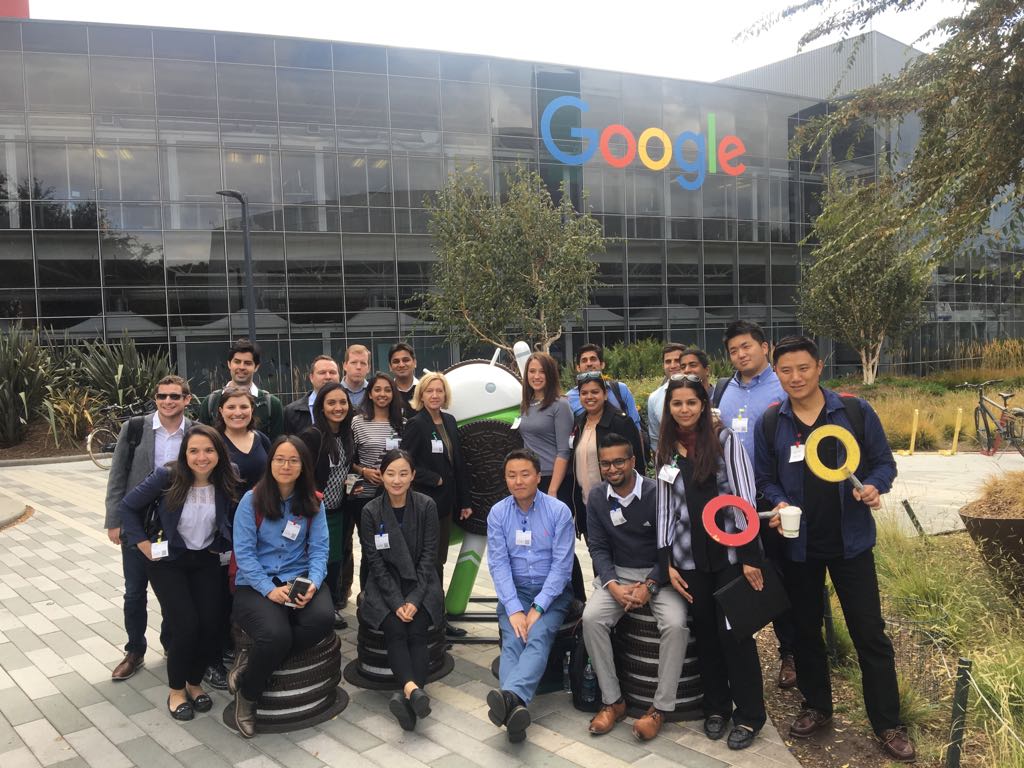Olin Tech Trek, 2017: Innovation, transformation, and the 2.0 workplace
- January 16, 2018
- By Guest Author
- 4 minute read

Led by the Olin Technology Club, 21 Olin MBA students traveled to Silicon Valley to visit technology companies and engage with alumni and executives. Megen Cowett and Maitrayee Goswami, both MBA ’19, wrote this post.
Owing in no small part to Anshul Singhal, president of the Olin Technology Club—along with Weston Career Center’s Karen Heise, acting director, and Melissa Warner, assistant director for employer relations—MBA students at Washington University’s Olin Business School had the opportunity to venture west approximately 2,000 miles to the US of A’s Bay Area.
Between San Jose and San Francisco, we visited six companies in two days, met handfuls of executives and WashU alumni, and experienced firsthand the impact of Silicon Valley’s latest trends.
Innovation and Business Transformation for Relevance
At HP Inc., we found that the company is not the same as it was 20, 10, or even a few years ago. HP COO Jon Flaxman, MBA ‘81, demonstrated how the company has recommitted itself to innovation in stunning ways.
The Olin Technology Trek members learned the ways HP has adapted over the years to overcome the daunting challenge of being relevant in an ecosystem which gives consumers a plethora of choices.
Lying on our backs in the HP Dome was an unforgettable experience. Created in collaboration with NASA, this bubble-shaped tent immersed us in a 360-degree digital movie experience while we laid on bean bags, wondering how technology strategy has transformed every industry. We observed that HP was well on its way to successfully revamping its “broken printer” image, with innovation and business transformation.
Internet of Everything
The Cisco experience with Rick Butler, MBA ’86, senior director of strategy and planning group, offered us detailed insight into their transformation from a customer-centric company to a relationship-centric company. We were intrigued by their socially relevant “Internet of everything” concept and how it brings together people, processes, data, and things.
While the world now connects through devices and is constantly dependent on wearables for daily activities, delivering the right data to the right person at the right time has become the need of the moment.
Cisco envisions that technology such as city-wide communications and network response systems, open parking space alerts, and integrated HVAC systems for low-energy consumption in buildings will benefit residents and help the public sector gain revenue. At Cisco’s headquarters, we were fascinated by an industrial robot that can detect errors and mend inefficiencies in work processes. We were impressed by Cisco’s vision of rendering smart cities with the Internet of things and its focus on improving lives of millions of people across the world.
Transparency to Consumers
Being transparent to consumers has been the primary focus of today’s technology companies and their services. Zillow empowers consumers by being transparent and sharing otherwise inaccessible real estate data to help consumers make informed and smart decisions.
The company focuses on innovations at the intersection of product, analytics, and design and helps connect real estate, mortgage, and rental professionals to consumers looking for properties best suited to their needs. At the Zillow office in San Francisco, Cynthia Taylor, director of product at dotloop, a transaction management platform, owned by Zillow, described to us the company’s efforts to bolster “power to people.”
Workplace 2.0
Whether to get the best out of their employees or, from a more cynical angle, to keep their employees at work for as long as possible, several of the companies we visited presented themselves as adult playgrounds, replete with skateboards, snacks, and sun loungers.
Our Olin alumnus greeted us at Facebook’s new facility in Menlo Park, designed by world-famous architect Frank Gehry. This building—with the “largest floor plan in the world” and numerous pieces of artwork—reflects the creative energy, culture, and collaborative environment of the young company.
Similarly, Google very much reflected for us what the future of the workplace looks like. Every amenity a millennial might desire avails itself from the moment you step onto the Googleplex. Our alumni brought us to Charlie’s Café, where we could choose from a dozen different cuisines—on the house.
Next, we looked on as a few Googlers unabashedly played beach volleyball in the middle of campus, in the middle of the day. After free raw juices and a photo op with the Android Oreo, we took a walk down the road to one of Google’s classrooms. WashU alumni spoke to us about the projects they are working on, but the prevailing theme was that Google is a risk-encouraging place of open inquiry. Those googley enough to work there ought to count themselves lucky.
To say that “technology has never been more relevant or ubiquitous than it is today” is a statement, I foresee, that will hold true not just today, but everyday hereafter. While MBA students of the past have opted for traditional roles in industries like finance and consulting, an increasing number of candidates are positioning themselves to transition to the technology industry as a sustainable career path.
In an article published by The Wall Street Journal in October, Amazon was touted as “upend[ing] recruiting at the nation’s elite business schools.” One Amazon intern, Abe Levy, “found his Amazon co-workers were friendly and observed that many seemed to have a better work-life balance than consultants do.”
We highly commend and owe great thanks to the Olin Technology Club for having the foresight to bring our students one step closer to the work, and workplaces, of the future.
Megen Cowett is a first-year MBA student from all over the United States. She is a news junkie and a crossword puzzle enthusiast, and loves perusing the App Store’s latest offerings.
Maitrayee Goswami is a first-year MBA student at Olin from the beautiful state of Assam in India. She is a designer and an entrepreneur. She loves road trips; her latest trip spanned 10 states and six national parks in the United States.
Reference: Gee, Kelsey. (2017, October). Another Thing Amazon Is Disrupting: Business-School Recruiting. Wall Street Journal. Retrieved from here.
Media inquiries
For assistance with media inquiries and to find faculty experts, please contact Washington University Marketing & Communications.
Monday–Friday, 8:30 to 5 p.m.
Sara Savat
Senior News Director, Business and Social Sciences
